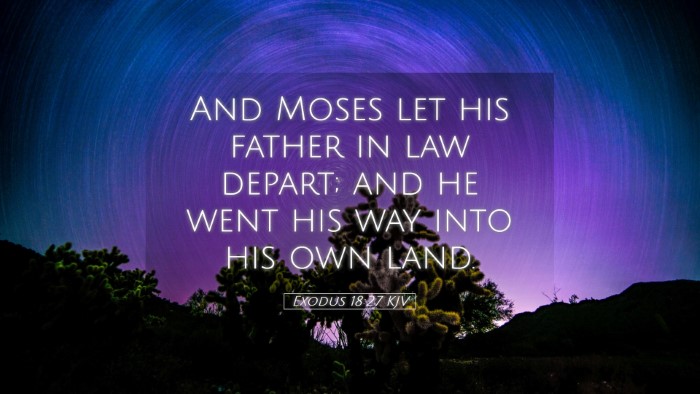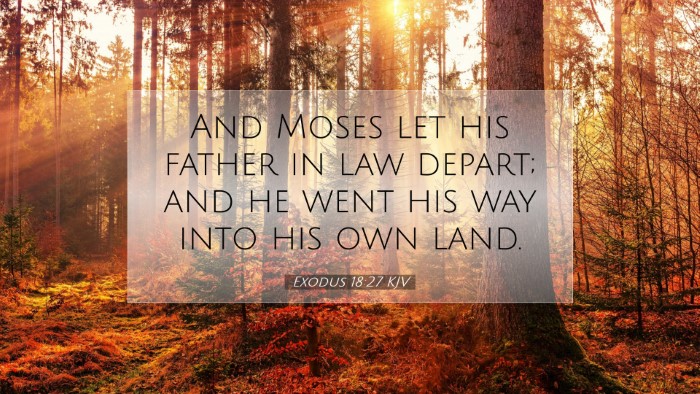Exodus 18:27 - Commentary Overview
Exodus 18:27 states, "And Moses let his father-in-law depart; and he went his way into his own land." This verse concludes the account of Jethro’s visit to Moses, providing a crucial moment in the narrative. It encapsulates themes of wisdom, acknowledgment, and the importance of familial ties in leadership.
Context and Importance
The discourse between Moses and Jethro, Moses’ father-in-law, is pivotal. Jethro's advice on the administrative structure of the Israelite community marks a significant development in the governance of the people of Israel as they journey through the wilderness.
- Spiritual Wisdom: Jethro represents a voice of wisdom from an outsider's perspective, illustrating that divine wisdom can be found beyond the boundaries of God’s chosen people.
- Delegation of Authority: The advice to appoint judges is not merely practical but reflects a divine principle of shared ministry and leadership.
- Family Relationships: The conclusion of this encounter emphasizes the role of family and honor even amidst great responsibilities.
Insights from Matthew Henry
Matthew Henry notes that Jethro's departure signifies a return to home after imparting essential wisdom. In his commentary, he highlights the importance of Jethro’s advice regarding leadership:
- Delegation: Henry emphasizes that delegating authority is crucial to sustaining long-term leadership. Moses learns that he cannot bear the burden alone, suggesting that leaders must listen to wise counsel.
- Respect for Family: Furthermore, Henry draws attention to the honor Moses shows towards Jethro, emphasizing the necessity of valuing family ties and the influence of parental figures in one’s life.
Insights from Albert Barnes
Albert Barnes provides a detailed examination of the implications of Jethro's advice and Moses' obedience. He remarks on the significance of Jethro's role as a counselor:
- Counsel and Obedience: Barnes notes that Moses' compliance with Jethro's counsel underscores a key principle: leaders must remain humble and receptive to guidance.
- Simplicity of Leadership Structure: The proposal of appointing lesser judges allows a more effective governance system, illustrating the need for structured hierarchy within community leadership.
Insights from Adam Clarke
Adam Clarke elaborates on the social and cultural context of the verse. He views Jethro’s departure as a symbol of apostolic sending:
- Apostolic Sending: Clarke suggests that Jethro, as a priest and father-in-law, represents an archetype of supporting figures who send leaders back into their mission fields bolstered with wisdom.
- Legacy of Wisdom: The acknowledgment of Jethro’s wise counsel is indicative of the legacy leaders should strive to leave; just as Moses learned from Jethro, future leaders should similarly seek guidance and mentorship.
Application for Pastors, Students, and Theologians
The commentary around Exodus 18:27 serves as a profound reminder for today’s leaders within the church and community. Here are key applications:
- Seek Guidance: Leaders are called to seek wise counsel and to listen to those around them, just as Moses did with Jethro. Wisdom can often come from unexpected sources.
- Delegate Responsibility: The principle of delegation seen in Jethro's counsel is essential in church leadership. Pastors and leaders should empower others, sharing the load to foster a healthier ministry environment.
- Honor Family and Mentors: The importance of family relationships and mentorship in spiritual growth cannot be overlooked. Leaders should maintain these bonds and allow them to influence their leadership style.
Conclusion
Exodus 18:27 is more than a travel narrative; it serves as a critical point of reflection for anyone in leadership roles. By embracing the insights gleaned from public domain commentaries, current and future leaders can cultivate an effective and spiritually grounded community lifting up the virtues of wisdom, delegation, and family support.


